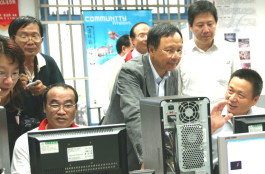Ministry of Education (MOE) firmly on the path of educational reform

Supplements Writer
There was a time when most Taiwan students had to wear a "bowl cut" hairstyle, lug extremely heavy school bags to school, and burn the midnight oil. Memorizing their textbooks with the sole intention of passing their exams. The publication of their textbooks was monopolized by the National Institute for Compilation and Translation.
That was 13 years ago. In 1994, a group of education experts and scholars and those who belong to the middle class started Taiwan's educational reform. It was the much-awaited re-engineering of Taiwan's education.
"It was like injecting new life and color into the system," said Tu Cheng-Sheng, the Minister of Education. "Today, you can even see some high school students with dyed hair. Their level of general culture has improved, and most important, students now have more freedom to choose their own educational path."
The pioneers of educational reform targeted five items: to liberalize education, care for every student instead of only select groups, increase the pathways to higher education, raise the overall quality of education, and promote life-long learning opportunities.
"There are still some dissenting voices," said Tu. "But, I think Taiwan is firmly on the path to educational diversity and liberalization. We should not give up the core values of educational reform for the sake of some minor technical issues."
One Standard, Multiple Textbooks
One major step taken along this path of reform was the adoption of the "one standard, multiple textbooks" policy. "There was really no need for students to buy several editions of the same textbook, which was what they had to do until recently," said Tu. "Our students could just as easily get high grades by totally understanding the subject matter instead of giving memorized answers to exam questions based on outmoded study materials."
While the "one standard, multiple textbooks" policy is a significant step in educational reform, some city and county governments have still decided to use one textbook edition in their schools under pressure from parents and some representatives who stubbornly - and illegally - hold onto the previous policy.
Another milestone of educational reform is the new 12-year compulsory education. However, after 10 education ministers, it is still awaiting implementation. "It will happen in 2009," said Tu. "We will also see zoning for senior high schools based on the principle of diversity in terms of school types, resources, functionality, and commuting distances."
However, to deal with the problem of parents sending their children to a school in another zone and driving up housing prices in that zone, the MOE plans to build excellent schools in each community. With a three-year budget of NT$ 16.3 billion (US$ 494 million), the "Building Excellent High and Vocational Schools" program hopes to encourage schools to develop their own teaching specialties and vie for subsidies. In 2009, excellent high schools and vocational schools are expected to comprise 80 percent of the public schools in Taiwan.
The MOE also plans to bridge the digital gap between city and country elementary and junior high schools. From 2005 to 2008, the MOE has been scheduled to spend NT$ 3 billion (US$ 90.9 million) to replace school computers. The MOE also organized the "College Youth Volunteer Centers," sending college students to teach students in rural areas to use computers and provide other kinds of services related to computers. Another MOE initiative is the establishment of Digital Opportunity Centers (DOC) in 168 remote towns to provide opportunities for community residents to surf the web and learn how to use a computer.
There has been an increase in the number of children born to foreign brides in Taiwan. The MOE has decided to provide subsidies to them in order to prevent them from falling behind in their studies. For minority groups, such as aborigines, low-income households, and single-parent families, the MOE will marshal a single budget of NT$ 50 million (US$ 1.5 million) annually.
The sharp increase in the number of colleges in Taiwan is another issue that the MOE plans to address by setting up high standards for establishing new colleges and a clear closure mechanism, such as the current college and department evaluation system meant to force underperforming colleges to close and give subsidies to outstanding schools. Further complicating this situation is the rising unemployment rate in Taiwan for college graduates because of the dramatic increase in colleges.
To help new graduates find better jobs, the MOE is encouraging students to learn additional skills in school and to study abroad to acquire the exposure needed to work within the global environment. The MOE also plans a survey of the employment situation of new graduates. The results of this survey will be included among a list of evaluation items for colleges, in order to encourage colleges to consider the future employment of their students.
"We cannot forget the demands of globalization," said Tu. "Globalization doesn't mean that we accept all the values of Western culture; it means a process of dialogue to understand each other."
"Taiwan students should first understand and preserve their own culture and then absorb the good things from other cultures. In this way, they can broaden their minds and knowledge and introduce Taiwan's culture to the world."
To increase Taiwan's presence within the global arena, the MOE dispatched some teachers to teach Chinese in foreign countries and to share Taiwan's unique culture with the world. At the same time, the MOE is promoting Taiwan research programs by offering lectures on Taiwan at world-famous universities.
"What we have to do is to overcome any difficulty along the way instead of turning back," said Tu. "I think this is the principle we should follow in reforming our educational system into one which is more diversified, creative, and equitable."